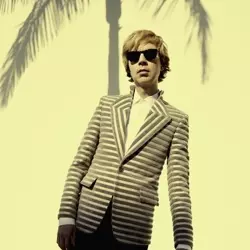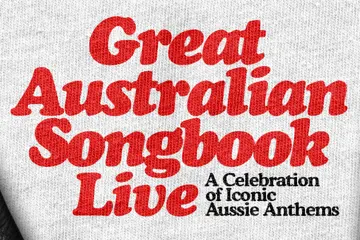 Beck
BeckThe ubiquitous Beck, arbiter of idiosyncrasy, innovation and evolution. Ever since his breakout third studio record, Mellow Gold, and its slacker anthem, Loser, Beck Hansen has continued to redefine his own approach to popular music, striving to connect with likeminded souls along the way. The spiky devil-may-care irreverence of Odelay!, the warped lounge histrionics of Midnite Vultures, the broken heart laid bare of Sea Change – all are kaleidoscopic images of Beck as an artist and as a person. He has always striven to push himself, to grow within and therefore defy the constraints of what it means to be a musician.
Case in point is his latest endeavour, The Song Reader. Containing 20 new and unreleased tracks, the 108-page book in which it comes features no actual listenable content at all; rather it's a device to incite a breakdown of the wall between the creator and the consumer. “It's an album of sheet music, which is designed so that you have to play the music yourself,” Hansen explains. “It's an experiment really, on what the conception of an album or the process of putting out music can be. It enlists the listener to participate and interpret the songs; they control the tone of each track. Just creating the book and working with different artists on the book after eight or nine albums, there are constraints on record packaging that this project freed up and expanded. I was able to indulge in every visual idea you could possibly want for this project. It became about creating a little package for these songs; the book itself is just a visual melange of different ideas. Then under that there is the concept of songwriting and the song itself; how we relate to music now opposed to how we did in the past. We had a much more intimate relationship with the music than we do now.”
The Song Reader is the ultimate tactile document, visually absorbing and arresting while literally eliciting a response from the audience. “There is going to be a website that (publishing house) McSweeney's is going to put together, where people are going to be able to post their versions of the songs,” Hansen expands. “And I'm sure that people will go to YouTube and all the other outlets. It will be a free-for-all, as it should be, and hopefully there will be some surprises along the way.”
There is no doubt that The Song Reader is an audacious achievement, yet it does not surprise that the germ of the idea sparked some 16 years ago, as he admits. “I put out Odelay! and a publisher was going to put out some sheet music for the record. But when they sent it to me, it was completely unnatural, because it was a transcription of a record that was a lot of sonic experimentation and weirdness. It didn't really come across as piano music to me. I became ashamed of putting out a book of music that wasn't going to be all that playable. I thought I should just write a bunch of songs and put them out as a book instead – it'd be a better use of paper and people's time. I called up McSweeney's in 2004 and we started this conversation on how to present the book and what it should be. Then there was this long gestation period before I finally took five months out of my time to really get it together.”
Don't miss a beat with our FREE daily newsletter
Hansen is constantly active in a wide array of diverse endeavours, searching for new avenues within which to create. From stepping into the producer's chair, working with Dwight Yoakam and Thurston Moore to collaborating on mixtapes with electronic wizard Tobacco and hip hop wunderkind Childish Gambino.
“I think it's important to put yourself or find yourself in environments where things are switched around and you have to figure out what it is you're doing, how you're going to make it work. You are putting yourself into boxes that you have to figure your way out of. It's easy to have a routine or formula that you just recycle, and it's a viable way to work, but I always enjoy going into different scenarios and seeing what happens, and it's never what you expect. I realised a long time ago that the only way you grow and to continue to grow and expand, there has to be some kind of friction against other elements. I may be completely wrong, but I remember at a young age noticing the fact that these golden eras of music, whether it be the jazz era or the '60s British rock or the '70s California singer-songwriter era, these people were all rubbing shoulders and playing off of each other – each person was leapfrogging another person's ideas. It's in these times where stuff happens. How many times do you hear about a Beatles session where Stephen Stills and some of the Stones were there, or Hendrix would drop by? There wasn't this competing factor – they were rubbing off on each other and leapfrogging each other into a totally different place, and that's a healthy thing.”
The explosion of the digital age and music's global access has led to an increased desire to pigeonhole as people want a reference point in order to engage with an artist and their music, to differentiate between the multitudes of options at their fingertips; the blessing of accessibility could also be a curse. “Within various scenes people are working with each other and touring together, but I don't see it as being as collaborative as it maybe was in other eras. Neil Young's most known song had James Taylor and Linda Ronstadt on it (Old Man); the openness to that camaraderie doesn't seem to be there. I don't know what people's attitudes are about opening up, but I do find that some people are pretty protective, and that's the way they work so that's fine, there's no hard and fast rule. I think there is a discrepancy between what they think their music is and what the rest of the world does. I know I've had that experience – in my head I'm doing one thing then I see it reflected back at me and I think 'God, that is not what I meant at all, that's the complete opposite of what I meant!' We do have that tendency to label something or at worst marginalise it by putting it into one category, but I think many times if you scratch the surface there is a lot more going on. When I was working with Dwight Yoakam I was trying to get him to cover a song by Girls, I thought for some reason that a song of theirs would have been perfect for him, that he would have done something that was really remarkable with it. And then just by coincidence Christopher Owens heard I was working with (Yoakam) and wanted to get in on a song. The people I was working with thought such an idea was wild, but in fact the singer was a fan and reached out of his own volition.”
PUSHING BOUNDARIES
Beck has always strived to push the boundaries of popular music and what can be done within the form, and within his Record Club he has brought a wide array of friends into the fold with him. The concept of reinterpreting an album and recording it in under 24 hours in an informal setting, Beck's Record Club has inverse correlations with his current exercise in The Song Reader music book, with the creative composition of the chosen tracks becoming limited only by the imagination and scope of the participants.
“I read that some of my favourite records had been written in a day or an evening; such as With The Beatles being recorded in a day, and Another Side of Bob Dylan was recorded in one night,” Hansen explains. “I was taken by this idea where you could record an album in one shot, and that's the way it used to be, and I think of records that I've done where I have spent all that time and all that energy – do you get that much further than they did in one day? Obviously they are great artists, but it goes to show what you can get when you put your mind to it – you can have some limitations and achieve amazing things in a short amount of time.
“Getting people to play music out of the context of their own musical sphere was another element I was eager to explore. It takes them out of the demands and pressures of their own careers and work commitments, expectations and fans, and to let go. It's all live, and people don't get to hear that side of musicians that often; just hanging out and playing music that is unpremeditated and natural.”
“It's a very draining experience as well. It's a cross between complete liberation and a triathlon competition. But it's the only way you can get people to commit; you can usually get anyone to commit to one day. In the case of Wilco, I don't think they showed up until after dinner. They came over at eight at night, and we did the whole thing (Skip Spence's Oar) by one in the morning, then off they went. It was powerhouse.”
Beck will be playing the following shows:
Saturday 10 & 11 November - Harvest Festival, Werribee Park, Melbourne VIC
Saturday 17 November - Harvest Festival, Parramatta Park, Sydney NSW
Sunday 18 November - Harvest Festival, Brisbane Riverstage and Botanic Gardens QLD















